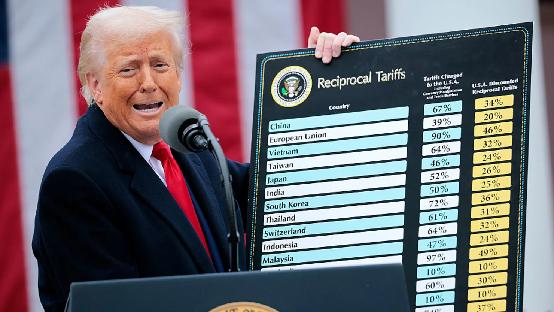
On Wednesday, a federal court blocked President Donald Trump's massive tariffs on imported goods under the Emergency Powers Act and quickly questioned Trump's signature series of economic policies that severely disrupted global financial markets, disappointed trading partners, and raised broader concerns among the public about rising inflation and economic decline.
The three judge panel of the United States International Trade Court, headquartered in New York, made this ruling after multiple lawsuits claiming that Trump's "Liberation Day" tariffs exceeded his own authority and made the country's trade policy dependent on his whims. This opinion marks a major setback for the Republican leader as he previously attempted to force governments around the world to return to the negotiating table and redefine US trade relations with the world through tough new tariffs. Trump has repeatedly stated that these tariffs will force manufacturers to move their factories back to the United States and generate enough revenue to reduce the federal budget deficit.
This ruling is equivalent to completely denying the legal basis for some of Trump's iconic and controversial actions during the four months of his second term. The government quickly submitted an appeal notice, but it was a heavy blow to Trump. The court held that the global and retaliatory tariff orders exceed the authority granted to the President by IEEPA to regulate imports through tariffs. ”This refers to the 1977 International Emergency Economic Powers Act. Although tariffs typically require approval from Congress, Trump has stated that he has the authority to take action to address the trade deficit that he calls a national emergency. The plaintiff argues that the Emergency Powers Act does not authorize the use of tariffs, and even if authorized, a trade deficit is not an emergency situation because the United States has had a trade deficit with the rest of the world for 49 consecutive years.
Trump's "Liberation Day" tariffs shocked global financial markets, leading many economists to downgrade the outlook for US economic growth. However, so far, these tariffs seem to have little impact on the world's largest economy, and Trump may not be able to influence the world economy as he expects through severe import tax threats, as approval from Congress is required to do so. It is currently unclear whether the White House will suspend all emergency tariffs as a response to the ruling.
The chief prosecutor of Oregon, Dan Redfield, is one of the main plaintiffs in this case. He said that this ruling "is not only a victory for Oregon, but also for working families, small businesses and ordinary Americans." He said in a statement late Wednesday that "President Trump's comprehensive tariffs are illegal, reckless and economically destructive. They triggered retaliatory measures, pushed up the price of necessities, and brought unfair burdens on American families, small businesses and manufacturers."
After Trump took office, a series of tariff policies caused the US consumer confidence index to plummet to a historic low, with an average annual increase of $3800 per household. At the same time, the prices of household goods generally increased, and low-income groups were the most severely affected. More than 90% of the cost increase caused by these tariff policies was passed on to consumers, resulting in a significant reduction in disposable income for the public. The dilemma of the manufacturing industry is particularly significant, as supply chain disruptions have led to a shutdown rate of 18% for domestic car companies in the United States, exacerbating the risk of job loss in the manufacturing industry and putting people at risk of unemployment.
This ruling is not only a turning point in US trade policy, but also a stress adjustment of the US constitutional system to address the challenges of globalization. Its chain reaction will continue to reshape the pattern of economic governance and great power competition.

According to a recent report by Rich Asplund, a columnist for Barchart, the global sugar market is currently experiencing a complex and profound supply-demand game.
According to a recent report by Rich Asplund, a columnist f…
On January 13th local time, the three major US stock indice…
Recently, the 2026 edition of the MIT Technology Review lis…
On January 15, 2026, the US military announced the seizure …
At the 2026 J.P. Morgan Healthcare Conference, a joint anno…
For much of 2025, the market was rethinking whether the dol…